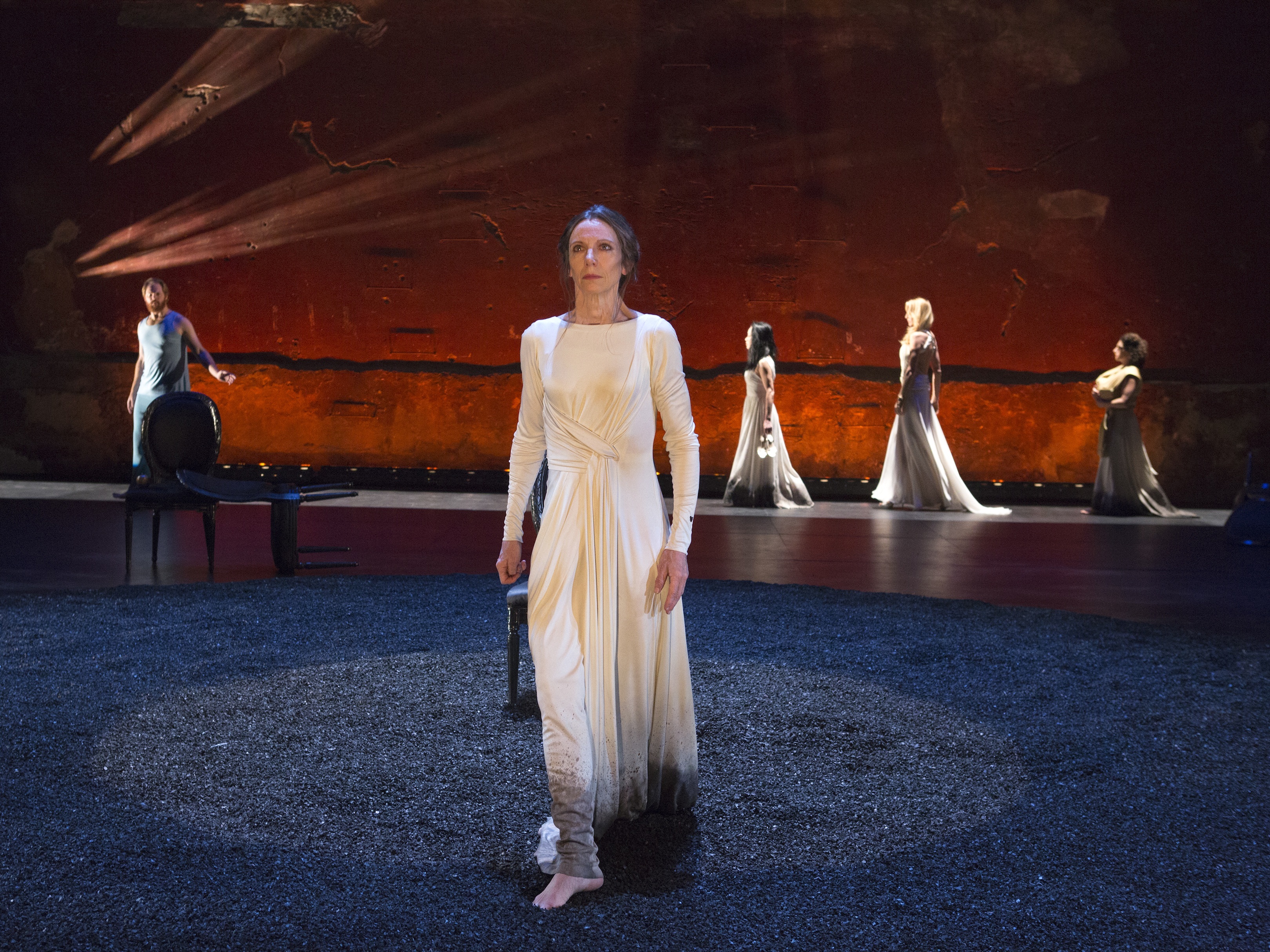My sincere apologies to the cast and crew of Siti Company and ArtsEmerson. This review is late because of the traumatic events of Friday, April 19. In my own personal turmoil, I was unable to write your review. I humbly beg your pardon!
presented by ArtsEmerson
adapted by Jocelyn Clarke from Trojan Women (After Euripides)
directed by Anne Bogart
created and performed by Siti Company
Original music composed and performed by the insanely talented Christian Frederickson
The Paramount Center
Paramount Mainstage
559 Washington Street
Boston, MA
April 17 – 21
ArtsEmerson Facebook Page
Siti Company Facebook Page
90 minutes with no intermission because the subject matter is so heavy that people might leave.
(Boston) The bodies of women are the casualties of wars. Even today in places such as The (Republic of) Congo, Uganda, Afghanistan, Syria, Steubenville and even late night in Harvard Square, women are held responsible for the violent decisions of men eager to wield their entitlement in public arenas. There is a political war in The Congo and every Spring there is a war against women on the streets. In any situation, women are blamed for the violence. Excuses range from acting in ways unbefitting a lady or luring men with our bodies. In reality, it is the perpetrators who are to blame. Rape, like other acts of violence, is never about sexuality; it is always about power. In Siti Company’s production of Trojan Women, this is still true.
Troy has been ransacked by the Greeks. The giant wooden horse has brought the downfall of King Priam. All of the men are dead and only the women of Troy are left to mourn them as they await what life still has in store. Queen Hecuba (Ellen Lauren) uses her mighty will to remain rigid as the Greeks tear her family and country apart. She is joined by her daughters and the infamous Helen of Troy (Katherine Crockett) as the city burns.
An obvious recurring theme in Trojan Women is grief and the ways women cope with it. The less obvious theme is how women are responsible for the actions of men. Helen is the more obvious example: Paris stole her from Greece and the entire world accused her of being a selfish whore. The remains true even after Menelaus (J. Ed Araiza) admits that Helen was only an excuse to storm Troy. He, like many, found it easier to blame the victim than to take responsibility for his actions. Even Hecuba, mother of Paris, who knew Paris was fated by the Gods to start a war with Greece, refused to acknowledge that Paris was to blame. Again, it is easier to blame the beautiful but mostly powerless Helen.
It is a stark production: the costumes are mostly monochromatic except where color creates a necessary contrast between characters. The women all wear white. The simple set is focused around a round, ankle-deep pit of what looks like springy, black mulch. Skirts and pant legs are stained black as actors walk across the stage. The pit could be full of suffering and by the night’s end all of the characters have waded through it.
Ellen Lauren dominates the stage. If her height wasn’t divergent from the other actors, one might think her ten feet tall. Not unlike Katharine Hepburn in the 1971 film by Mihalis Kakogiannis, Lauren gives ironshod gravitas to her role (without Hepburn’s posturing). Her fellow Trojans were equally as brave and charismatic on the stage.
Leon Ingulsrud gave great depth to the Envoy – a character that could be played flat. Instead, he was compassionate, sympathetic and occasionally humorous when others might have been cold.
It must be noted that adapter Jocelyn Clarke took the liberty of adding to Euripides’ play to give the Women more lines. This may annoy purists. The additions are mostly seamless within the structure of the play. They still leave many questions unanswered within the context of the epic.
At the beginning of the play, Poseidon (Brent Werzner) speaks of the “jealousy of men” and the “vanities of gods” that manipulate life events into war. Odysseus (Gian-Murray Gianino) later says that “ in war, there is no right or wrong; there is only necessity.” These two figures, even as the women tremble before them, do not consider the consequences of their actions as faced by the survivors. Even the audience was inoculated. Menelaus threatens to murder Helen in cold blood and the audience laughed. Violence against a woman is funny? Would it be so funny if the audience was composed of citizens from Troy and Helen was our figurehead instead of a scapegoat? Euripides’ play might be fiction but it’s subject is not.
The only individual who can truly prevent rape is a potential rapist. Accusing the powerless of having power is cowardly. Be careful how you watch this show. This is not a production for the weak willed or insipid.

